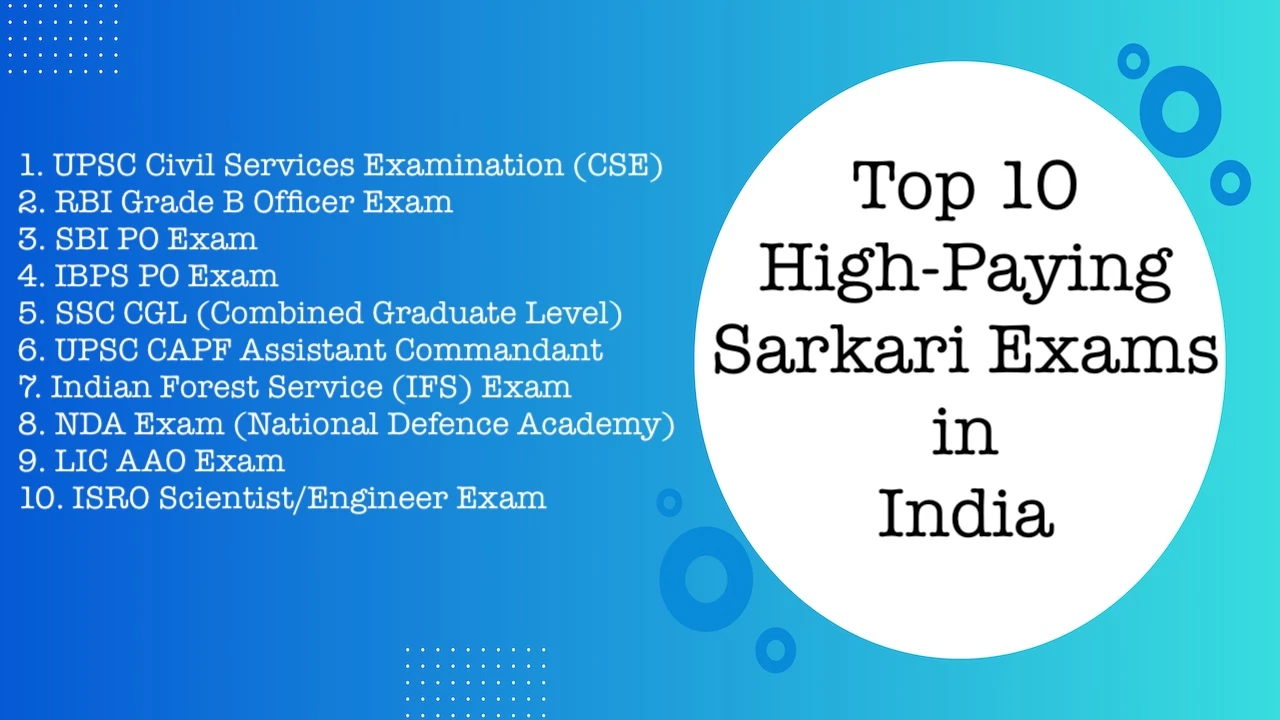The highest-paying sarkari exams in India include UPSC Civil Services with salaries up to ₹2.5 lakhs monthly, followed by banking exams like IBPS PO (₹90,732 gross) and RRB NTPC (₹35,400-62,000). These competitive examinations provide job security, attractive packages, and prestigious positions across various government sectors including administrative services, banking, railways, and defense.
Government jobs remain the most sought-after career choice for millions of Indian students due to their stability, excellent benefits, and social status. These examinations test candidates’ knowledge, analytical skills, and aptitude across multiple subjects while opening doors to lucrative career opportunities in the public sector.
1. UPSC Civil Services Examination (IAS/IPS/IFS)
The Civil Services Examination stands as India’s most prestigious government exam. The civil services are considered amongst the toughest exams in India and attract the largest crowds of applicants. Through this exam, a candidate can join one of the consortia of services like the Indian Administrative Services [IAS], Indian Police Services [IPS], and Indian Foreign Services.
| Position | Starting Salary | Maximum Salary |
|---|---|---|
| IAS Officer | ₹56,100 | ₹2,50,000 |
| IPS Officer | ₹56,100 | ₹2,25,000 |
| IFS Officer | ₹56,100 | ₹2,05,000 |
Additionally, officers receive grade pay, allowances, accommodation, and numerous perks that significantly increase their total compensation package.
2. IBPS PO (Probationary Officer)
Banking sector examinations consistently rank among the highest-paying opportunities. Institute of Banking Personnel Selection (IBPS) has revised the IBPS PO Salary 2025, increasing the gross pay to Rs. 90,732.77. The position offers excellent career growth prospects in public sector banks.
Key salary components include basic pay of ₹57,062, along with special allowance, dearness allowance, and house rent allowance. Probationary officers enjoy job security with opportunities for rapid promotions.
3. RRB NTPC (Non-Technical Popular Categories)
Railway recruitment provides stable employment with attractive compensation packages. The NTPC examination covers multiple positions across Indian Railways with varying salary structures.
| Level | Position | Salary Range |
|---|---|---|
| Level 6 | Station Master | ₹35,400 – ₹1,12,400 |
| Level 5 | Goods Guard | ₹29,200 – ₹92,300 |
| Level 4 | Senior Clerk | ₹25,500 – ₹81,100 |
Railway employees receive additional benefits such as free travel passes, medical facilities, and housing allowances that enhance their overall compensation.
4. SBI PO (State Bank of India Probationary Officer)
State Bank of India offers one of the most lucrative banking positions in the public sector. The gross salary package reaches approximately ₹1,03,000 monthly including all allowances and benefits.
SBI PO positions provide excellent career advancement opportunities with potential progression to senior management roles. The bank also offers performance-based incentives and comprehensive insurance coverage.
5. IBPS RRB PO (Regional Rural Banks)
Regional Rural Bank officers play vital roles in rural banking development. The IBPS RRB PO In Hand salary is approximately ₹74,561 per month. The gross salary is around ₹80,437, which includes the Basic Pay of ₹48,480 along with Special Allowance, Dearness Allowance, House Rent Allowance, Location Allowance, and Learning Allowance.
RRB PO positions offer work-life balance with opportunities to serve rural communities while earning competitive salaries comparable to urban banking roles.
6. SSC CGL (Combined Graduate Level)
Staff Selection Commission conducts this examination for various Group B and Group C positions across central government ministries and departments.
| Post | Pay Scale | Grade Pay |
|---|---|---|
| Assistant Audit Officer | ₹9,300-34,800 | ₹4,200 |
| Income Tax Inspector | ₹9,300-34,800 | ₹4,200 |
| Central Excise Inspector | ₹9,300-34,800 | ₹4,200 |
SSC CGL positions provide job security with regular increments and promotion opportunities to higher grades within the government hierarchy.
7. GATE (Graduate Aptitude Test in Engineering) – PSU Recruitment
GATE scores enable recruitment in prestigious Public Sector Undertakings. The GATE exam is the most preferred way to get a job in Public Sector Undertakings. These public sector jobs will land you in IOCL, ONGC, SAIL, Coal India, BSNL, MTNL, BPCL, and BHEL.
PSU engineers enjoy excellent compensation packages ranging from ₹40,000 to ₹1,60,000 monthly depending on the company and position level, along with performance bonuses and stock options.
8. Defence Services (NDA/CDS)
Military services through National Defence Academy and Combined Defence Services examinations offer prestigious careers with competitive salaries and exceptional benefits.
Officers receive basic pay starting from ₹56,100 with military service pay, field area allowance, and accommodation facilities. The total package often exceeds ₹1,00,000 monthly including all benefits.
9. RRB JE (Junior Engineer)
Railway Junior Engineers handle technical operations and maintenance across the extensive railway network. Starting salaries range from ₹35,400 to ₹1,12,400 based on level and experience.
Technical positions in railways offer excellent career progression opportunities with chances to reach senior engineering positions through internal promotions and departmental examinations.
10. NABARD Grade A
National Bank for Agriculture and Rural Development officers focus on agricultural and rural development financing. Grade A officers earn approximately ₹1,00,000 monthly including all allowances.
NABARD provides specialized banking experience in agricultural finance with opportunities for rural posting allowances and development project involvement.
Salary Comparison Table
| Exam | Starting Package | Maximum Package | Job Security |
|---|---|---|---|
| UPSC CSE | ₹56,100 | ₹2,50,000 | Highest |
| IBPS PO | ₹57,062 | ₹90,733 | High |
| RRB NTPC | ₹25,500 | ₹1,12,400 | High |
| SBI PO | ₹64,000 | ₹1,03,000 | High |
| IBPS RRB PO | ₹48,480 | ₹74,561 | High |
Preparation Strategies for High-Paying Sarkari Exams
Study Schedule Planning
Successful candidates typically dedicate 6-8 hours daily for exam preparation. Create a structured timetable covering all subjects with regular revision cycles and mock test practice.
Subject-Wise Approach
Focus on quantitative aptitude, reasoning ability, and general awareness as these subjects appear across multiple examinations. Build strong fundamentals before attempting advanced topics.
Current Affairs Mastery
Stay updated with national and international events through newspapers, magazines, and reliable online sources. Maintain monthly current affairs notes for quick revision.
Benefits Beyond Salary
Job Security and Stability
Government positions provide unmatched job security with protection against economic downturns and industry fluctuations. Employees enjoy tenure-based employment with minimal termination risks.
Pension and Retirement Benefits
Central government employees receive contributory pension schemes, gratuity payments, and post-retirement medical benefits that ensure financial security after service completion.
Work-Life Balance
Most government positions maintain standard working hours with adequate leave provisions, festival holidays, and family-friendly policies that promote healthy work-life integration.
Recent Trends in Government Recruitment
Digital transformation has modernized the recruitment process with online applications, computer-based testing, and transparent selection procedures. Get latest updates about various popular competitive and govt exams 2025-26 in India such as UPSC, SSC, Bank, TET, Police, Railway, Defence etc. indicates continuous recruitment activities across sectors.
Skill-based assessments and domain-specific knowledge tests are becoming standard practice, requiring candidates to demonstrate practical competencies alongside theoretical understanding.
People Also Ask
UPSC Civil Services offers the highest salary potential with IAS officers earning up to ₹2,50,000 monthly at senior levels, including allowances and benefits.
Most high-paying positions require a bachelor’s degree from a recognized university. Technical positions may require specific engineering or professional qualifications.
Preparation duration varies from 6 months to 2 years depending on exam difficulty, candidate background, and study intensity. UPSC typically requires 12-18 months of dedicated preparation.
Government salaries are subject to income tax like private sector employment. However, certain allowances and benefits may have tax exemptions under specific conditions.
Yes, most examinations allow working professionals to apply. However, check specific exam notifications for age limits and service bond requirements.
Age limits vary by exam and category. General category candidates typically have limits between 21-32 years, with relaxations for reserved categories and ex-servicemen.
Government services offer structured promotion systems based on seniority, performance, and departmental examinations, ensuring career advancement opportunities.
Many examinations offer regional language options for certain papers. Check individual exam notifications for available language choices and eligibility criteria.
Conclusion
High-paying sarkari exams continue attracting millions of aspirants seeking stable careers with attractive compensation packages. Success requires dedicated preparation, consistent effort, and strategic planning across multiple examination attempts.
Start your preparation journey with proven strategies and utilize practice tests to enhance your chances of selection in these competitive examinations.

